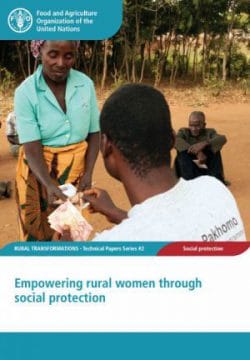Policy highlights:
- Social protection schemes often target female-headed households and designate women to receive transfers to enable their economic empowerment. Nevertheless, these schemes cannot achieve such empowerment in isolation from gender equality objectives and without delivering them in ways that ensure women’s participation and coordinating them with gender-sensitive development interventions and services.
- This study reviews five common social protection instruments from a gender perspective by using 11 empowerment indicators:
- access to health, education, productive assets, finance, and technology and extension;
- productive and beneficial labour status;
- infrastructure tailored to women’s needs;
- membership of rural organizations and networks;
- legal empowerment;
- positive change in gender roles;
- intra-household bargaining power/decision-making.
- This shows that cash-transfer schemes require complementary services to ensure that women recipients maintain control over incomes and decision-making capacity. Asset transfer schemes should take account of women’s capacities, needs and aspirations in terms of resources and skills development. Public works programmes should improve women’s skills and promote employability after completion of the programme.











